Gaza war: Where does Israel get its weapons?
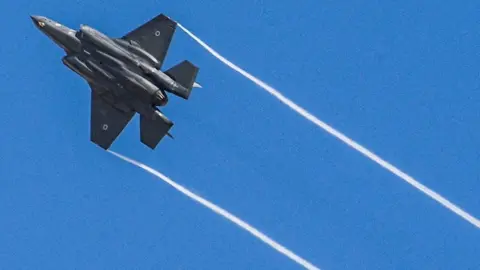 AFP
AFPWestern governments have come under pressure to halt arms sales to Israel over how it is waging the war against Hamas in the Gaza Strip.
Israel is a major weapons exporter, but its military has been heavily reliant on imported aircraft, guided bombs and missiles to conduct what experts have described as one of the most intense and destructive aerial campaigns in recent history.
Campaign groups and some politicians among Israel's Western allies say arms exports should be suspended because, they say, Israel is failing to do enough to protect the lives of civilians and ensure enough humanitarian aid reaches them.
On Monday, the UK said it was suspending about 30 export licences for military equipment to Israel for use in military operations in Gaza following a review of Israel's compliance with international humanitarian law.
UK arms exports to Israel are relatively small compared to Israel's total, but Israel's prime minister denounced the UK's decision as "shameful".
The war was triggered by Hamas's attack on Israel on 7 October, in which about 1,200 people were killed and 251 others taken hostage. More than 40,000 people have been killed in Gaza since then, the territory's Hamas-run health ministry says.
Israel insists that its forces are working to avoid civilian casualties, accuses Hamas of deliberately putting civilians in the line of fire, and says there are no limits on aid deliveries.
United States
The US is by far the biggest supplier of arms to Israel, having helped it build one of the most technologically sophisticated militaries in the world.
According to the Stockholm International Peace Research Institute (SIPRI), the US accounted for 69% of Israel's imports of major conventional arms between 2019 and 2023.
The US provides Israel with $3.8bn (£2.9bn) in annual military aid under a 10-year agreement that is intended to allow its ally to maintain what it calls a "qualitative military edge" over neighbouring countries.
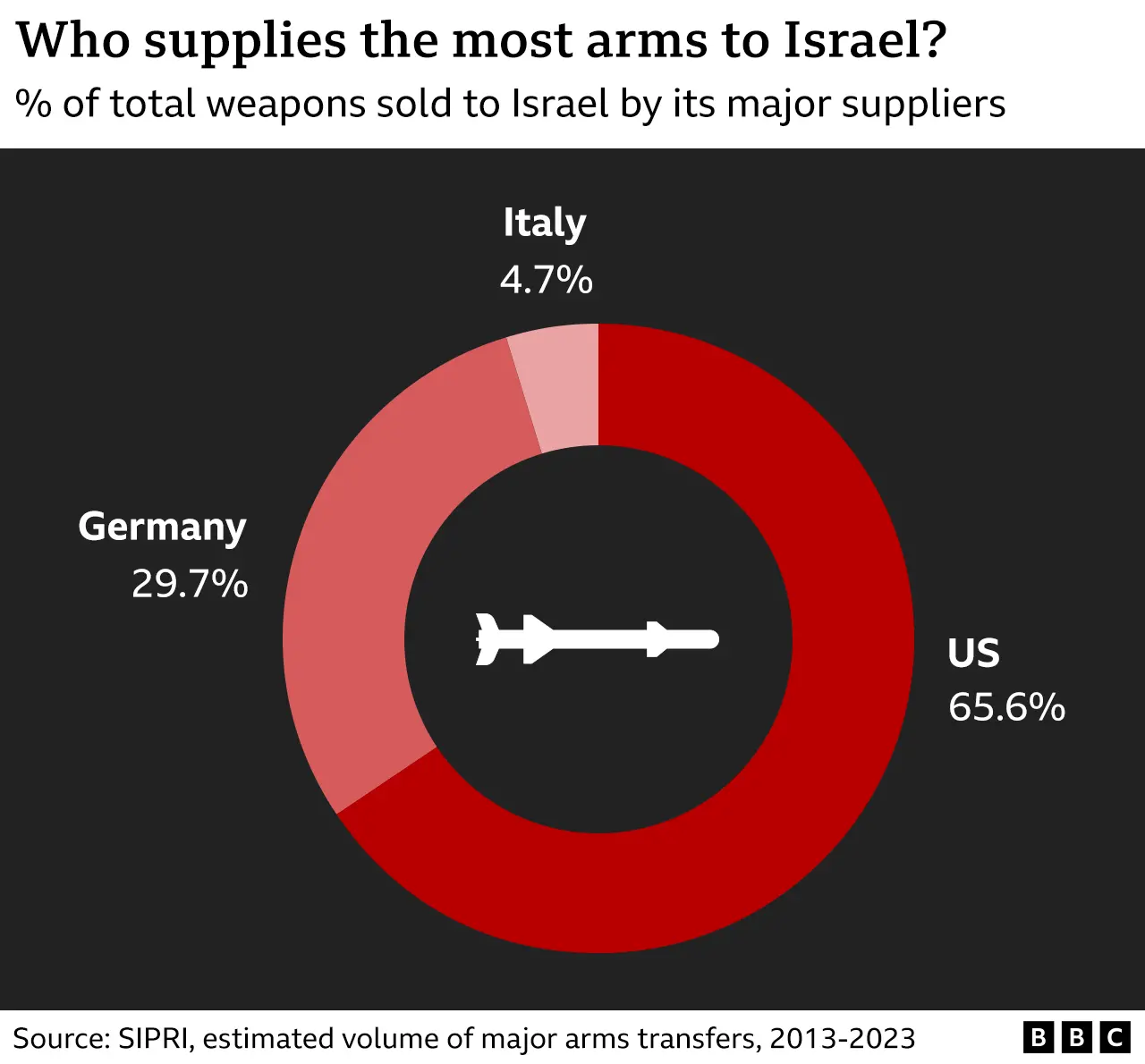
Part of the aid - $500m annually - is set aside to fund missile defence programmes, including the jointly developed Iron Dome, Arrow and David's Sling systems. Israel has relied on them during the war to defend itself against rocket, missile and drone attacks by Palestinian armed groups in Gaza, as well as other Iran-backed armed groups based in Lebanon, Syria, Iraq and Yemen.
In the days after Hamas's 7 October attack, President Joe Biden said the US was "surging additional military assistance" to Israel.
SIPRI said the US rapidly delivered thousands of guided bombs and missies to Israel at the end of 2023, but that the total volume of Israeli arms imports from the US that year was almost the same as in 2022.
Last December, the Biden administration made public two urgent sales to Israel after using emergency authority to skip congressional review. One sale was for 14,000 rounds of tank ammunition worth $106m, while the other was for $147m of components to make 155mm artillery shells.
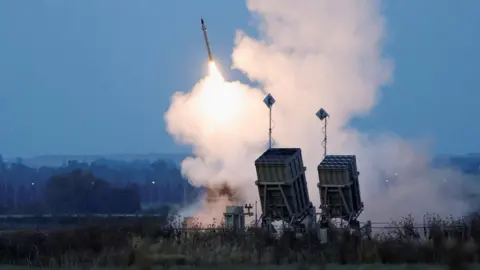 Reuters
ReutersUS media reported in March that the administration had also quietly made more than 100 other military sales to Israel since the start of the war, most falling below the dollar amount that would require Congress to be formally notified. They were said to have included thousands of precision-guided munitions, small-diameter bombs, bunker busters and small arms.
In May, the US paused a shipment of weapons to Israel for the first time, as representatives of Mr Biden's Democratic Party in Congress and supporters became increasingly concerned by Israel's plan for a ground offensive on the southern Gaza city of Rafah.
US officials said 1,800 2,000lb (907kg) bombs and 1,700 500lb bombs would be held back over concerns that civilians could be killed if they were used on densely populated urban areas. In July, US officials said the delivery of the 500lb bombs would be authorised, but that the 2,000lb bombs would continue to be withheld out of continued concern over civilian casualties.
Then last month, the Biden administration notified Congress that it had approved $20bn of weapons sales to Israel. They comprised an $18.8bn package for up to 50 F-15IA jets and upgrade kits for 25 F-15I aircraft that Israel already has; an unspecified number of 8-tonne cargo trucks worth $583m; 30 medium-range, air-to-air missiles for $102m; and 50,000 120mm mortar rounds for $61m. However, those weapons are not expected be delivered to Israel until 2026 at the earliest.
Germany
Germany is the next biggest arms exporter to Israel, accounting for 30% of imports between 2019 and 2023, according to SIPRI.
In 2022, Israel signed a €3bn ($3.3bn; £2.5bn) deal with Germany to buy three advanced, Dakar-class diesel submarines, which were expected to be delivered from 2031 onwards. They will replace the German-build Dolphin-class submarines currently operated by the Israeli Navy.
Last year, the European nation's weapons sales to Israel were worth €326.5m ($361m; £274m) - a 10-fold increase compared with 2022 - with the majority of those export licences granted after the 7 October attacks.
The German government said in January that the sales comprised €306.4m worth of military equipment and €20.1m of "war weapons".
According to the DPA news agency, the latter included 3,000 portable anti-tank weapons and 500,000 rounds of ammunition for automatic or semi-automatic firearms. It also said that most of the export licences were granted for land vehicles and technology for the development, assembly, maintenance and repair of weapons.
Chancellor Olaf Scholz has been a staunch supporter of Israel's right to self-defence throughout the war and, although his tone on Israeli actions in Gaza has shifted in recent weeks and there has been some debate in Germany, the arms sales do not appear to be at risk of suspension.
 Reuters
ReutersItaly
Italy is the third-biggest arms exporter to Israel, but it accounted for only 0.9% of Israeli imports between 2019 and 2023, according to SIPRI. They have reportedly included helicopters and naval artillery.
The Campaign Against Arms Trade (CAAT), a UK-based pressure group, says exports and licences of military goods by Italy to Israel were worth €17m ($18.8m; £14.3m) in 2022.
In 2023, sales of "arms and munitions" amounted to €13.7m, the magazine Altreconomia has cited national statistics bureau ISTAT as saying.
Some €2.1m of exports were approved between October and December 2023, despite the government's assurances that it was blocking them under a law banning weapons sales to countries that are waging war or are deemed to be violating human rights.
Defence Minister Guido Crosetto told parliament in March that Italy had honoured existing contracts after checking them on a case-by-case basis and ensuring "they did not concern materials that could be used against civilians".
United Kingdom
In December 2023, the UK government said British exports of military goods to Israel were "relatively small", amounting to £42m ($55m) in 2022.
That figure fell to £18.2m in 2023, according to the Department for Business and Trade's records.
Between 7 October 2023 and 31 May 2024, 42 export licences were issued for military goods while there were 345 extant licences. The Department for Business and Trade said the military equipment covered under the licences included components for military aircraft, military vehicles and combat naval vessels.
CAAT says the UK has granted arms export licences to Israel worth £576m in total since 2008. Much of those have been for components used in US-made warplanes that end up in Israel.
In September 2024, UK Foreign Secretary David Lammy announced the immediate suspension of about 30 export licences for items used in Israeli military operations in Gaza.
He said he had received an assessment that had concluded there was a "clear risk" that certain military exports "might be used to commit or facilitate a serious violation of international humanitarian law".
"The UK continues to support Israel's right to self-defence in accordance with international law," he stressed.
The licences cover components for military aircraft, including fighter jets, helicopters and drones, as well as items that facilitate ground targeting.
Israeli Prime Minister Benjamin Netanyahu denounced the UK's decision as "shameful" and "misguided". He warned that the arms ban would embolden Hamas and insisted Israel was pursuing a just war by just means.
Israeli defence industry
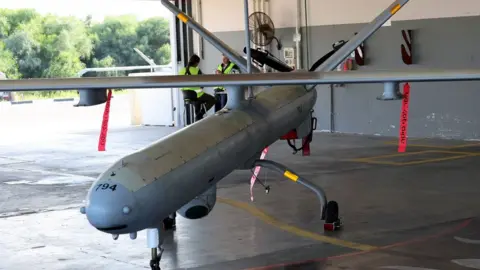 AFP
AFPIsrael has also built up its own defence industry with US help and now ranks as the ninth-largest arms exporter in the world, with a focus on advanced technological products rather than large-scale hardware.
It held a 2.3% share of global sales between 2019 and 2023, according to SIPRI, with India (37%), the Philippines (12%) and the US (8.7%) the three main recipients.
Israel's defence exports were worth more than $13bn in 2023, according to the Israeli defence ministry.
Air defence systems made up 36% of those exports, followed by radar and electronic warfare systems (11%), fire and launch equipment (11%), and drones and avionics (9%).
In September 2023, just before the war began, Germany agreed a $3.5bn deal with Israel to buy the sophisticated Arrow 3 missile defence system, which intercepts long-range ballistic missiles. It was Israel's largest ever defence deal and had to be approved by the US because it jointly developed the system.
US military stockpile in Israel
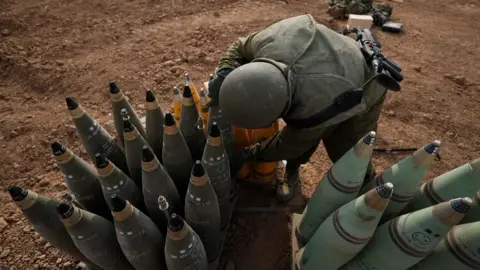 EPA
EPAIsrael is also home to a vast US arms depot set up in 1984 to pre-position supplies for its troops in case of a regional conflict, as well as to give Israel quick access to weapons in emergencies.
The Pentagon shipped about 300,000 155mm artillery shells from the War Reserve Stockpile Ammunition-Israel to Ukraine following the Russian invasion.
Stockpiled munitions at the depot have also reportedly been supplied to Israel since the start of the Gaza war.
